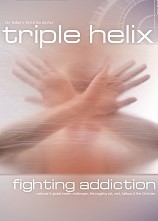Limits to love
Where is the boundary line between simple reportage and campaigning? In February, the BBC screened documentary Love Unlimited featuring a 23-year-old woman who says she is polyamorous - in a relationship with two men she claims to love equally. 'I just don't see why I should artificially limit the amount of love that I put out into the world. I'm greedy,' she says. The BBC will often say it simply reports and this doesn't mean it's taking sides. Not even when no alternate view is presented?
BBC News 6 February 2018 bbc.in/2FQXXrm
Malnutrition deaths rising
The Office for National Statistics shows malnutrition was the underlying cause or a contributory factor in 351 deaths in NHS hospitals in England and Wales in 2016. That is up 59 on 2015 and the highest number in the last decade. There is debate about the exact meaning of the numbers. Hunger may be a contributory factor, but not the underlying cause. Many with malnutrition are already very ill. But Caroline Abrahams, a director at Age UK, said the situation was 'shocking', a 'huge hidden problem in our communities.'
Guardian 5 February 2018 bit.ly/2BXTVuV
Carillion collapse hits healthcare
There is a health side-story to the collapse of the building giant Carillion. One example is the delay in completing the new £335m Royal Liverpool Hospital. The first projected completion date was March 2017. Now it is likely to drag on throughout 2018. A senior staffer with the Unite Union said, 'The Government needs to prioritise how stalled projects are restarted.' The BMA said the company's collapse raised 'serious questions about PFI deals and the tendering of NHS services'. Clearer information was needed about when work on the hospital will resume.
BBC News 6 February 2018 bbc.in/2BZbaMn
Limitations to online consultations
On the face of it, providing online consultations seems a good thing for patients. It cuts down on travel time and reduces demand for appointments for routine matters, thus reducing the load on GP surgeries. But the Care Quality Commission has found shortcomings with nearly half of independent online services, including pharmacies, websites and apps. Many prescribe high volumes of painkillers without talking to the patients' GPs and inappropriately prescribe antibiotics. While the CQC welcomes innovation in delivery of health services, nothing should stand in the way of patient safety, it says. Telegraph 23 March 2018 bit.ly/2pKmsAe
Health is a stressful business
Feeling stressed? You are not alone. New research says healthcare is the third most stressful occupation in the UK. Some 66% healthcare workers report significant work-related stress. A survey of 3,000 healthcare workers found they ran a close third in the stress stakes behind people in financial services (69%) and government employees (68%). Younger people are vulnerable to work-related stress, with almost three quarters (73%) experiencing it. Work was significantly more likely to cause stress and emotional strain for healthcare workers than any other aspect of their lives.
Practice Business 23 March 2018 bit.ly/2pKxiGj
A serious addiction
Down Under, fixed odd betting terminals (FOBTs) are nicknamed 'one armed bandits' for good reasons. Eutychus notices that the Archbishop of Canterbury has mounted his own campaign to limit odds to say, £1 or £2 a spin. The government must heed his words. There are FOBTs that permit stakes of up to £100 every 20 seconds and they are addictive. What is more, it is poor people who are most vulnerable to them, not least in the anonymity of betting shops. No wonder they are called 'the crack cocaine of gambling'.
Guardian 18 March 2018 bit.ly/2IWQ0U7
For want of hugs
The fall of the Ceausescu regime in Romania brought to light one of the saddest stories of that era. Children brought up in the country's orphanages suffered from serious social deprivation having received no cuddles or human warmth. A question for our times: is political correctness, which makes teachers, doctors and youth group leaders reluctant to touch, doing similar harm? 'Is this hypervigilance of boundaries beginning to harm our mental health?' asks Paul Coccoza in a thought-provoking Guardian article. In contrast, 'a touch industry is burgeoning in Europe, Australia and the US.'
Guardian 7 March 2018 bit.ly/2G2IWUO
Five new medical schools
Five new medical schools are to be opened in England in a move by the government to boost numbers of training places. The focus will be on cities and towns where trainee doctors are proving hard to recruit, says Health Secretary Jeremy Hunt. New schools in Sunderland, Lancashire, Lincoln, Canterbury and Chelmsford will mean an extra 1,500 places by 2020. 90% of the new places will be outside London. Some 630 of the 1,500 new places will start this September, with the rest to follow in 2019 and 2020.
BBC News 20 March 2019 bbc.in/2IBT8V5
Plastic poison
There's been a huge media groundswell condemning the use of single use plastic. Britain is a world leader in the packaging industry, so this has not been comfortable for some enterprises. But is plastic harmful to health, the health of children particularly? It's a question being asked with the discovery that a chemical called Bisphenol A (BPA) found in plastic can be found in more than 80% of teenagers. Already the US Food and Drug Administration has banned BPA in baby bottles and infant feeding cups, but no one as yet knows how dangerous it is.
Guardian 19 February 2018 bit.ly/2Ca6Q1g
Slavery by any other name
A bizarre case. Japanese millionaire Mitsutoki Shigeta has won a court battle to pursue custody of 13 babies he fathered through surrogate Thai mothers. In fact Shigeta is believed to have fathered at least 16 babies in Thailand. His so-called 'baby factory' case has prompted the government of Thailand to ban commercial surrogacy. Woman renting out their wombs, quite frankly, is a form of slavery, but it carries big financial rewards. Commercial surrogacy is rife in Ukraine. Women there earning wages of £140 a month can earn ten times that through surrogacy.
BBC News 20 February 2018 bbc.in/2I7WkXp
































